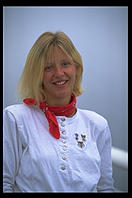
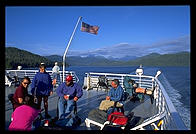
With a small harem surrounding me, I drove off the Alaska Marine Highway
at 10:00 AM. Although Alison, Elke, and Jo-Anne each managed to make do
with one backpack, the minivan was now stacked to the gills and
riding so low that we couldn't drive over a crush-proof cigarette
pack without a sickening dragging sound. As we headed up the Interstate
toward the Canadian border, I noticed how much easier it was to travel
with three companions rather than one. I didn't have to make
conversation, just drive and listen.

"The girl with the German passport will have to have it stamped at Immigration," said the smiling fellow in the little booth. In fact, we all had to show various IDs to an unfriendly woman. Although we weren't detained for more than a few minutes, we felt unwelcome.
Our first taste of British Columbia was uninspiring. We drove through the flat fields of the Fraser Valley and then built-up areas until the highway simply ended in a residential neighborhood. Elke was determined to pay no more than $6 Cdn. per night for a bed so she and Alison asked to be dropped at a backpacker's hostel near the railroad station, which turned out to be Vancouver's highest crime neighborhood.
I dropped Jo-Anne at her friend's house in the chic Kitsilano district and proceeded to my friend Jim's office at the University of British Columbia. Jim and I took in the university's Museum of Anthropology, the pinnacle of high-culture tourism in Vancouver and notable for its collection of totem poles. I was stunned by the quality of the work, especially by the warlike Haida Indians. The Canadian government never managed to sign a treaty with the Haida, who are therefore suing to reclaim all of British Columbia's coast and fishing rights. I thought I was tired of totem poles, but Jim was able to bring most of the figures to life for me.
East Ocean Hong Kong Restaurant lies outside Chinatown, like all of the really good Chinese restaurants here. Lest your surroundings in a modern office building cause you to suspect the restaurant's authenticity, East Ocean brings your dinner to the table flopping around in plastic buckets. Jim and I regretted that we lacked the Hong Kong matron's ability to inspect the gills and eyes of the rock cod, and we simply asked our waiter to "please kill these animals, cook them, and bring them back." Jim says that it is the influx of Hong Kong Chinese that is responsible for this presentation; 10 years ago, everything brought to your table was well-killed.
Jo-Anne had promised to meet us later in the evening, but when I phoned her friend's house, I was told that "she met some friends and went away with them for a week-long bike trip." When I returned to the table, Jim said I looked stunned.
"I was just rejected, but it was by a woman I only met yesterday. This is much better than being rejected by women in Boston. In Jo-Anne's case, I can say to myself, `She wouldn't have rejected me if she knew me better.' What I hate is when women who know me perfectly well reject me."
Not one to let humiliation spoil an evening, I let Jim take me toward the beautiful sunset by Stanley Park. The First Law of Photography is that whenever you see something really beautiful, you won't have your camera. My seven cameras were in my van; I was in Jim's car. I helplessly watched the sunset drip liquid gradations of red behind the mountains around the city.
Jim treated me to gelato in a chic West End cafe, right next to a high-rise apartment block known as "K-Y Towers" (this is the area of town popular with homosexuals). As we walked back to the car along the dark seawall path, it was nice to see how many young women were still out. This isn't Central Park in terms of either crime or fear of crime. Drug dealers and gangs kill each other, mostly with knives, but the average Vancouverite is able to enjoy the city at all hours and in almost all neighborhoods.
"Strip joints in Boston are really grimy, and you feel sleazy going into one. You have to see how different they are here," Jim pointed out. I had no experience for comparison, but I was surprised to see how clean, well-lit, and sober "The Cecil" was. Customers were neatly dressed and hardly anyone smoked. There were only a handful of women customers, all sitting at tables with counterculturish men. Entertainment at The Cecil consists of multiple TVs showing sports and a big stage in the center. The stage is equipped with a hot tub and a small fountain. Men who really want to get involved with the show sit "lip-side" on the edge of the stage, while friends who want to converse sit at tables farther back.
Jim and I walked in during the middle of the Amateur Night stripping contest. We saw four women, one of whom looked no more than 15, display themselves for five minutes each while prancing around the stage to pop music. The music was played at a moderate enough volume that we diehard nerds were able to carry on a mathematics and computer science discussion. The girl who looked 15 won the contest. After the contest was over, we watched two professional strippers. Jim revealed for me the mysterious formalized structure of the strip. During the first song, the woman dances around the stage fully clothed. The second song leaves her topless and the third bottomless. She spends her fourth song writhing on the floor, disporting in the fountain, or lolling about in the hot tub.
Patrons left to themselves will simply sip their drinks and watch quietly. An announcer periodically reminds the audience to "show her how much you appreciate her," at which point a desultory howling rises up only to die a few seconds later. Strippers appear to enjoy their work and are treated with some deference, as are the cocktail waitresses, who are conservatively clad. Jim used to have a tenant who called herself an "entertainer." In fact, she stripped for a living, and Jim learned something about their culture: "Don't touch any of them; they all have boyfriends who are bikers."
Considering it was my first time, I think I acquitted myself well. We spent about 20 minutes sipping our drinks and then left at 11:30. Jim told me I'd done much better than his last out-of-town guest, an MIT faculty member friend of ours.
"He got so excited that he spilled a glass of beer all over me."
Jim's neighborhood is full of friendly young families. Everyone has young children, and six women were due in one month recently.
"This is British Columbia. Once any animal gets here, it thinks it is time to spawn," Jim noted.
I was overjoyed to find messages on the answering machine from both Elke and Jo-Anne. Jo-Anne hadn't left town, and they both wanted to go to Vancouver Island with me.
Vancouver Photo Album
From the top of the tourist tower...
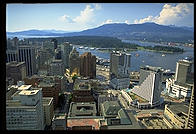
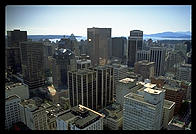
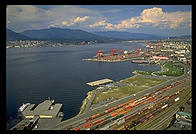
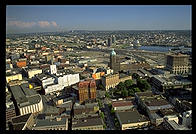
My visit to the Jewish Nose Research Center. 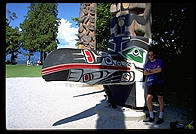
Gastown...
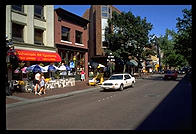
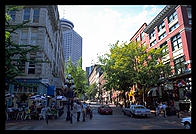
By the water...
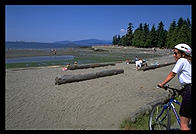
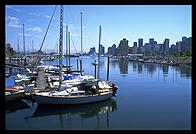
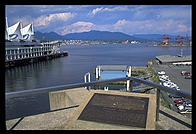
Wednesday, August 4
A week cruising down the Nile River builds strong friendships. I hadn't seen Michael for 18 months, I didn't call him until noon on my last day in Vancouver, and he'd just spent 12 hours driving back from the dragon boat races in Calgary. Yet he treated me like royalty. Michael rolled up to Jim's house in his new Mazda and introduced me to his parents. His mother was born in South Africa and his father in Hong Kong, but the family has become thoroughly Canadian. Michael speaks pretty good Cantonese, but he wouldn't be too happy to live in Hong Kong, which he has visited several times.
"It is the only city I know where if the walk sign comes on and you don't move off the curb immediately, someone will push you off."
We drove to a medium-size Chinese restaurant nearby that was packed with big round tables. A party of two would feel out of place here amidst the enormous (all Chinese) families chowing down. It was a bit hard to talk over the din, but we managed to catch up on old times.
Michael took a six-month leave of absence from his engineering job here and worked as a wildlife photographer in Africa. I met him towards the end of that assignment, which he looks back upon wistfully. He'd like to escape the routine again, but his boss cringes at the thought of losing him.
Michael is in his mid-30s and still living at home. I asked his mother why she hadn't introduced him to any nice Chinese girls.
"That's his department," she said abruptly.
"When I'm traveling, it is no problem to meet women. But here at home, they get irritated when I talk to them," Michael mourned.
After dinner, Michael showed 400 slides from his six months in Africa (less than 2% of the 600 rolls he exposed). Just one photo of mating cranes would have been worth the entire trip.
"All of these animals will be gone in a decade or two. These countries are facing choices about whether to feed animals or people; they are going to choose people," Michael noted.
His observations about animal behavior betrayed substantial learning, but also his western nose. He introduced quite a few animals with "these smell really bad."
I'd pictured Vancouver Island as a rugged parkland with occasional small
towns inhabited by sea kayakers. Traversing the east coast via a
heavily used divided four-lane highway reveals an island that is heavily
populated, packed with fast food chains, and quite industrial. Elke,
Jo-Anne, and I took a 90-minute ferry ride to Nanaimo and then started
the 60-mile drive toward Victoria.
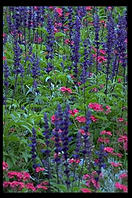
Jo-Anne illustrates what a wonderful person can be produced when Australian openness and directness is mixed with education, intelligence, and a certain amount of ambition. She moved to Toronto six years ago with her Australian husband and has been working as an actuary. Just recently, Jo-Anne shed her husband and the grueling Toronto pace in favor of the outdoorsy life centered around Vancouver.
Elke came to Michigan as a Fulbright Scholar a year ago. She calls herself "East German," in direct defiance of the politically correct lingo over there. Elke has the kind of passionate response to literature, art, and life that so many people have lost. She can appreciate a Shakespeare play, a beautiful city, or a photograph with the wide-eyed wonder of a child mixed with the sophistication of a well-educated 25-year-old.
I had been a little apprehensive about traveling with two people who'd
only met three days before, but Elke and Jo-Anne sorted themselves out
into complementary roles. Jo-Anne sat in the front seat and expertly
navigated; Elke lounged across the back seat and supplied us with
country-western tapes from her collection.
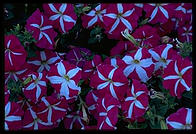
We spent the afternoon among an eye-popping explosion of artistically placed flowers in Butchart Gardens, Vancouver Island's #1 tourist attraction, then drove to McDonald Park, the closest provincial campground to the metropolis of Victoria. All 30 campsites were taken, but three happy-go-lucky Dead Heads from Ontario agreed immediately to let us share their site.
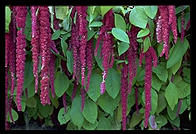 Paul was raised in England but lived in Canada a bit as well. His seven
years of following the Dead on tour was recently cut short by some
vaguely described brushes with the law in California.
Paul was raised in England but lived in Canada a bit as well. His seven
years of following the Dead on tour was recently cut short by some
vaguely described brushes with the law in California.
"Did they dump you at the border?" I asked.
"No, I just ran."
I noted that most of my friends who toured with the Dead gave up after a few months because they couldn't shake their middle-class values.
"I'm trying to get mine back," Paul responded.
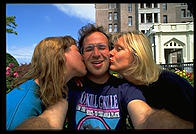
Friday, August 6
Nobody can organize like a German girl. I'd been meaning to clean out the disgusting cooler for over a month; Elke hadn't been in the car 24 hours before the cooler and all the Tupperware containers were washed. After washing the cooler and showering, we drove to downtown Victoria under gorgeous blue skies. I immediately got on my bike to tour the city alone. I hadn't gone more than two miles before I ran into Alison. She insisted that I come with her to Castle Craigdarroch, built on the top of the hill by John Dunsmuir. Dunsmuir was a Scottish coal miner who came here in the 1850s and became western Canada's richest man. He built a stone castle and fitted it with wood carvings and stained glass just in time to die.
After the castle tour, every aspect of which delighted Alison, we drove to Chinatown for dim sum, which Alison had never had. Despite her sober lobbying job in Washington, D.C., Alison told me how irresponsible she feels at age 31. She skips and jumps along the street and dates a 22-year-old bike messenger.
"Can you believe it? I've never dated a man who wore a suit to work."
Alison hadn't fallen in love with Alaska.
"A place needs history to be interesting. Europeans destroyed the native cultures in Alaska, but haven't been there long enough to build interesting cities of their own."
After I dropped Alison at the fast ferry to Seattle, I got back on the bike to tour scrubbed-up beflowered Victoria some more. Like all capitals, this city prospers on the "tax the many to enrich the few" principle, and public places are extraordinarily nice for a town with a small population (250,000 including an endless suburban sprawl). Most of the downtown shops cater to tourists, however, and it is difficult to get a sense of the real city life, especially on a fine summer's day.
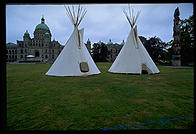 Elke's sensitive nose sniffed out the finest "clash of cultures"
photograph in the city: teepees and a totem pole on the front lawn of
the enormous stone parliament building. Measured by weight at least,
European culture seems to have triumphed by a factor of a million to
one.
Elke's sensitive nose sniffed out the finest "clash of cultures"
photograph in the city: teepees and a totem pole on the front lawn of
the enormous stone parliament building. Measured by weight at least,
European culture seems to have triumphed by a factor of a million to
one.
We drove down the west coast of Vancouver Island to Sooke and camped in
the city campground, right next to the Sooke River. I tossed the car
keys to Jo-Anne and Elke and biked down the 50 km Galloping Goose Trail,
a former railroad. Hard work was rewarded with good views over the
Sooke Inlet, a lagoon, and a large freshwater lake. I rode back on
little country lanes past peaceful sheep farms, little marinas, and lots
of forest. It changed my opinion about Vancouver Island.
Saturday, August 7
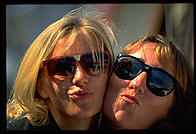
Elke and I bid farewell to passportless Jo-Anne at the ferry terminal and hopped a ferry across the narrow channel to Port Angeles, Washington. As the ship rolled in a slight swell, I fixed my eyes on the horizon and recalled Jackie Mason's "there's nothing sadder than a Jew with a boat" routine. Port Angeles was ugly and slightly shrouded in clouds; I felt strangely little joy at entering the U.S. for the final time this trip.
After a swim in the local 25-yard pool, where Elke revealed why East Germany used to win all those Olympic medals, we considered how best to enjoy Olympic National Park.
The main portion of the park is a 40-mile square surrounding the Olympic Mountains, a ring of 6000+' peaks including 8000' Mt. Olympus. These mountains were cut off from the rest of the continent by glaciers until about 12,000 years ago. A unique ecosystem evolved here, and many species of plants and animals common in the nearby Cascades are missing from the Olympics, grizzly bears for example. After hanging out with Jo-Anne and Elke, I developed a particular fondness for the Olympic marmot; he lives in a colony with two adult females and their children.
Twelve feet of rain falls each year on the ocean side of the mountains, creating rain forests and glaciers. The continental side is drier but still plagued by weather that can only be called miserable. As an afterthought in 1953, a big section of coastline was tossed into the park. It looks a lot like the Oregon coast. Lush cliffs meet violent sea.
Elke and I started our tour in the Hoh Rain Forest, named for the Hoh
Indians who inhabit this area. We slowly hiked around the eerie Hall
of the Mosses trail. Huge trees hung down their twisted moss-covered
branches. I forgot to bring my 20mm lens and mosquito repellent;
stupid, stupid, stupid. We were beset by mosquitoes just enough to
leave Elke's beautiful face a mess but not quite enough to justify a
run back to the car. I gave Elke a two-hour photography lesson.
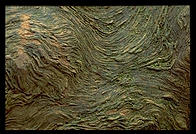
"What separates snapshot from art is a tripod and Fuji Velvia film," I noted. "You have to learn how to use manual exposure on your Nikon and remember that the camera assumes a world that is 18% gray. If you point it at something white, it thinks the world has suddenly gotten brighter; if you point it at something black, it thinks the light has dimmed."
"I always wanted to meet a man who could teach me about photography
and computers."
With fantastic manual dexterity and inherent style, Elke prepared a scrumptious lunch. I'd been eating in restaurants and going hungry or snacking when far from civilization. Elke wanted to live out of the cooler. Rather than get on a soapbox and preach about how much more noble it would be to live her way, she simply shopped, organized, and cooked.
After a shower at the Rain Forest Hostel, we drove down Highway 101 to
Ruby Beach, part of the coastline portion of Olympic National Park.
Enormous piles of driftwood littered the bottom of the cliffs. A
blanket of clouds covered the land and the first few miles of sea. The
sun eventually sank low enough to illuminate the undersides of the
clouds, the cliffs, and the enormous rock formations in the surf. It
was pure sorcery but didn't last.
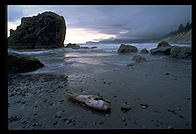
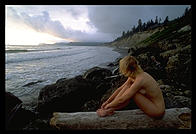
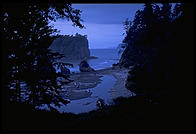
After dark, we camped at South Beach. Elke was desperate for some couscous and soup so I promised to boil up water with my brand-new stove and pot. Problem 1: fill stove with fuel. Solution: find motor home and beg. A retiree lent me his genuine Coleman funnel and fuel filter. Then he got some pliers so we could open the fiendishly child-proof fuel can. Problem 2: find recently purchased pot. Solution: tear apart car in the dark for 30 minutes; find motor home and beg. Problem 3: pressurize stove with pump for the first time in the dark without reading all the instructions. Solution: spend 30 minutes fruitlessly pumping without realizing that one is supposed to hold one's thumb over a little air hole; cry like a child.
Elke made sandwiches. I felt like a total failure as a man, but Elke never criticized or betrayed the slightest trace of contempt or disappointment.
Joel's girlfriend Denise (Chapter XIV) demonstrated a contrasting female attitude in a subsequent phone call. Without even knowing about the contretemps with the stove, she called me a wuss for eating in restaurants rather than cooking for myself.
Monday, August 9
We stayed in the tent until quite late listening to the rain fall on the fly and soak through sleeping bags and various other interior items. Anxious for a tourist attraction, we followed signs to the Hoh Tribal Center. As the state highway entered the Indian reservation, we could feel the federal dollars stroking the car's undercarriage. The road took on a creamy smoothness that was nothing short of delicious. The 200 Indians on this reservation live in rather attractive houses whose yards are festooned with satellite dishes.
The Tribal Center turned out to be a dumping ground for Indian schoolkids with nothing to do on their summer vacation. Elke called Mauricio, a Colombian she'd met in Juneau.
"He's going to fly to San Francisco to meet me, rent a car, and then drive me down the coast to Los Angeles. He doesn't have any hopes of getting involved; he's just trying to be nice to me for showing him around Juneau. Colombians are Catholic; they're very conservative about such things."
Right.
We spent the rest of the day eating, driving through one downpour after another, and eating some more. Elke shattered some of my misconceptions about East Germany. I'd thought of Communist East Germany as a drab, gray, joyless place full of people dying to get out and move to the West. Elke had been perfectly happy growing up under the old regime and isn't particularly fond of the new system.
"One thing I have trouble adjusting to is the concept of property. We didn't go walking through people's front yards, but everything else in East Germany was public. You never had to worry about whether you were trespassing because everything belonged to you in some sense."
Clothing at least wasn't gray. Elke's high-fashion wardrobe predated Unification. If she and her friends couldn't afford something, they sewed it themselves. Sometimes less is more anyway.
"I hardly owned a bathing suit until I came here; I can't believe how prudish Americans are."
I reminded her that we couldn't all be young, 5' 6" and 120 lb.
Politics has never been Elke's main interest, but she told me about East Germany's five political parties, including the dominant socialist unity party (SED). Elke only voted once, but she was satisfied enough with the system to vote voluntarily for SED.
"East Germany was very safe, very community-oriented, there was good day care for kids and a lot of good opportunity for women to work. I am very sorry when I see how materialistic many of my old friends are becoming. I really don't like the values of West/Unified Germany. Even things that are supposed to be better are in fact worse. Bureaucracy, for example, is much worse in Unified Germany."
Elke is so well-educated and speaks such good English that her deficits jarred me. She'd never heard of Jack Nicholson, Cary Grant, Stanley Kubrick, or any other Hollywood icons. "I've only had three years of American movies, you have to remember." She'd never heard of Gummi bears, staples of West German childhood. A lot of attitudes that I'd thought of as German aren't very prevalent among East Germans according to Elke.
"In my experience the difference between East and West Germany is greater than the difference between West Germany and the U.S."
Speaking of the U.S., how had she found it?
"I really enjoyed my first six months here, but then began to see people as living on islands separated by phone answering machines, connected only by wires to the outer world. There was too much space. I tried to immerse myself in American culture, but then stepped back. I began to reject American things, to try to hold onto my German culture. I was so happy whenever I heard someone speaking German. Now I think I am better at appreciating both cultures."
A couple overheard part of this conversation in a restaurant, and the wife came up to our table. She peppered me with questions: Where did you go to college? Where are you from? What are you doing now?
Elke smiled and said, "That's what I love about America; that would never happen in Germany."
Hurricane Ridge is supposed to afford views to Victoria in one direction and Mt. Olympus in the other. Elke and I hiked for two hours but never saw much more than a few hillsides in front of solid white cloud. We drove back down to Port Angeles to find sunshine and a nice ride through the Olympic Peninsula toward Seattle. A golden sunset kissed the treetops as we rolled onto the Bainbridge Island ferry and drew across the waters of Puget Sound toward the tall buildings of downtown.
The trip had been going far too well. Hospitable people everywhere, sunny weather in Alaska, the lingering spell of Katmai, relatively crash-free driving. What I really needed was the pain of staying under the same roof as my beloved ex-girlfriend Rebecca and her new boyfriend Dave. I dropped Elke at a friend's and arrived at Rebecca and Dave's house at 10:30 PM to find them together in the kitchen. Rebecca had dyed her hair red and was wearing knee-length jeans and a punk top; she looked more like a rock groupie than a physics Ph.D. Dave, a soft-spoken guy of medium height, looked more like his social work day job than his drumming night job. He was a good listener and rather reflective.
Rebecca tried to start about five arguments that we should have had five years before, but Dave and I got along surprisingly well. Rebecca had told him I was a "nerd," and he was pleasantly surprised to find my belt free of calculators or other paraphernalia.
I had a joyous reunion with my letters and stayed up until 2 reading them and writing replies. Although I'd not felt lonely for some weeks, I was suffused with warmth every time I opened a friend's missive.